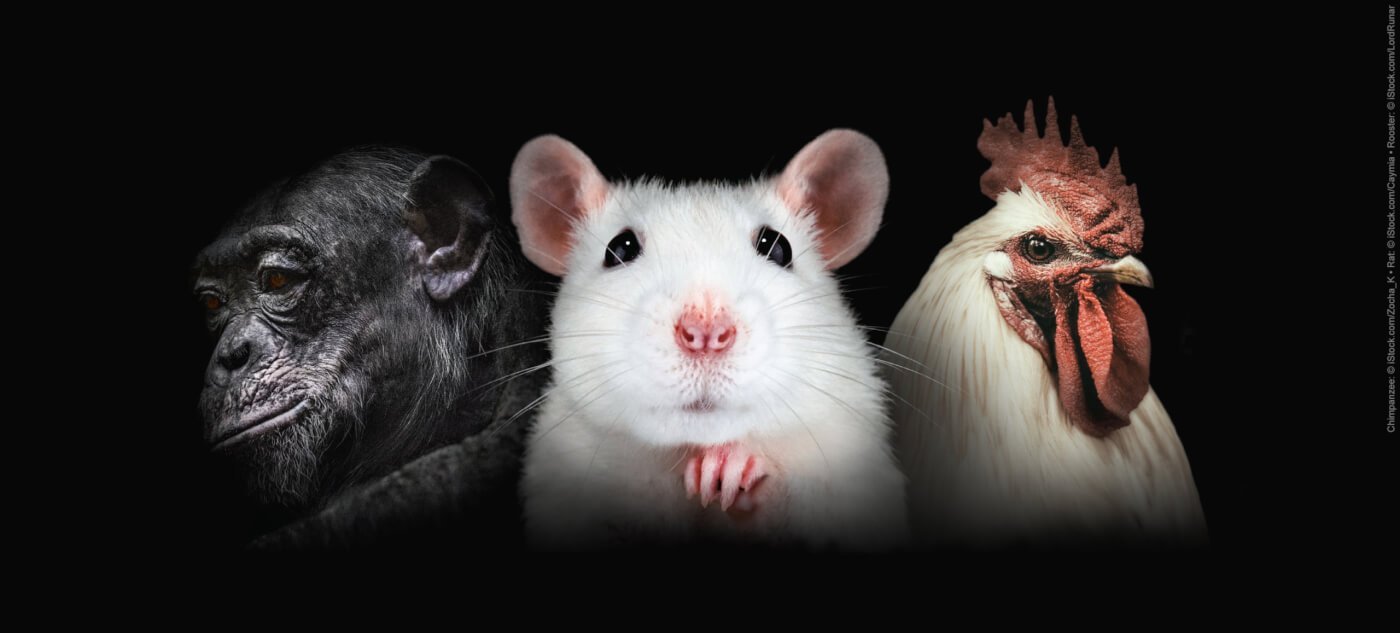
Speciesism
What is speciesism?
Have you ever wondered how someone can be moved to tears by a news story about an abused dog, but not be affected by eating a bucket of chicken wings that caused several birds to suffer and die? And why some people think it's okay to eat pigs, but that it's grotesque to eat dogs?
The reason for this is speciesism. Speciesism is a misguided belief that one species is more important than another. You may be familiar with terms such as racism and sexism, which refer to discrimination based on ethnicity or gender. In the same way, speciesism is the term for discrimination based on species. Many people do not realize that they are speciesist because this way of thinking is deeply rooted in our society—but speciesism has many negative consequences.
How speciesism affects us
From an early age, most people are conditioned to regard certain species as worthy of care and compassion and others as unworthy—all based on arbitrary human preferences. Consciously or unconsciously, parents, teachers, the media, and other influences send children the message that puppies and kittens are “friends,” cows and chickens are “food,” and rats and mice are “pests.” Most children are also taught that human desires, needs, and interests always trump the desires, needs, and interests of all other species.
As a result, we learn to ignore our own conscience, which tells us that it is wrong to mistreat others. We convince ourselves that we have the "right" to lock animals up in laboratories, experiment on them, and kill them because it can help humans. We delude ourselves that it is okay to eat ice cream made from cow's milk because our desire for dessert outweighs a mother cow's right to nurse and care for her calf. That it is okay to steal sheep's wool for sweaters and scarves and ducks' feathers for pillows. That it is acceptable to keep orcas in barren tanks for profit and "entertainment," and that the joy we get from casting a hook into the water to catch fish outweighs the pain inflicted on them when they are pierced in the lip and pulled into an environment where they cannot breathe. Humans use speciesism to try to justify every conceivable form of cruelty.
In his groundbreaking book Animal Liberation, philosopher Peter Singer defines speciesism as "a prejudice or preconceived attitude in favor of members of one's own species and against members of other species." But it is also speciesist to treat one animal's life as more valuable than another animal's. A particularly disturbing example of this is when animal shelters hold fundraisers to help dogs and cats by serving meat from cows, pigs, or chickens. This makes as much sense as running over a kindergarten class on the way to volunteer at a senior center.
What can we do?
All animals deserve equal attention, regardless of what humans think of them. Although most of us have been steeped in speciesism throughout our lives, we can—and must—overcome this destructive mindset.
We can start right now by changing the way we talk about other species. Animals are thinking and feeling beings—so we should not refer to them in the same way we refer to inanimate objects such as old chairs or boots. Instead of calling an animal "it," use "he" or "she." And we can avoid using sayings that are derogatory to other species or make light of their suffering.
Rejecting speciesism also means that we must take an objective look at our personal choices and change those that harm animals. One of the best places to start is by expressing our disapproval of animal testing by only buying products that have not been tested on animals and by only donating to charities that never fund or conduct animal testing. Removing animal products from our plates by becoming vegan is also fundamental, and Dyrenes Alliance plenty of resources to help us—just sign up for our 22-day vegan challenge, VeganerUdfordringen. When we begin to see other species as sentient beings and individuals, we will not want to exploit them for their skin, fur, down, or wool, so we will choose animal-free clothing, just as we will entertain ourselves in humane ways instead of patronizing circuses and zoos.
It is time to recognize that all sentient beings deserve to be treated with respect and compassion. We can reject speciesism and act with integrity and consistency toward all living beings, and the first step is to acknowledge that all animals have the right to live without being exploited by humans.
"If I could get everyone in the world to watch one movie, I would have them watch EARTHLINGS."
- Peter Singer, author of Animal Liberation
EARTHLINGS is a 2005 documentary film about humanity's total dependence on animals for economic purposes. The film is divided into five chapters (pets, food, clothing, entertainment, and scientific research) and is narrated by Joaquin Phoenix, with music by Moby, and written, produced, and directed by Shaun Monson.


